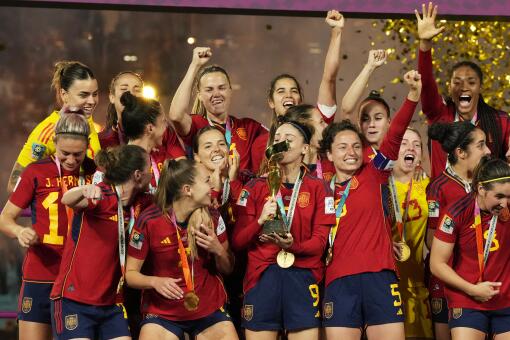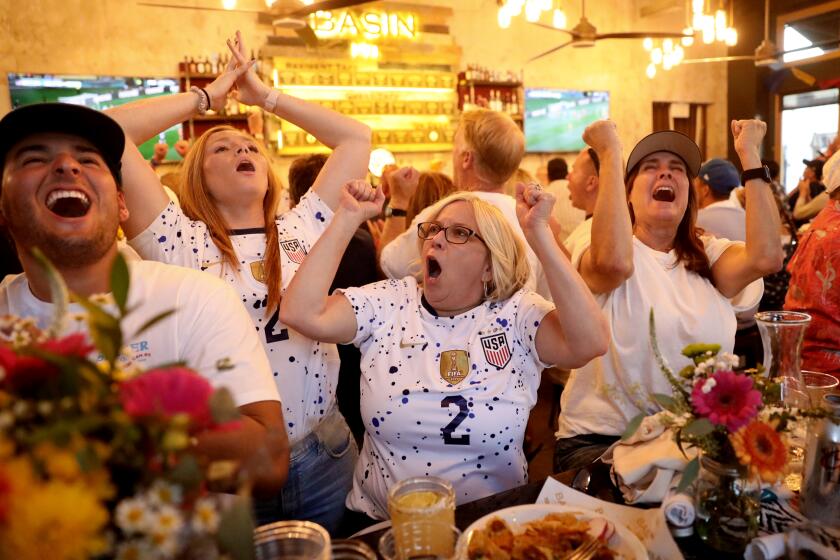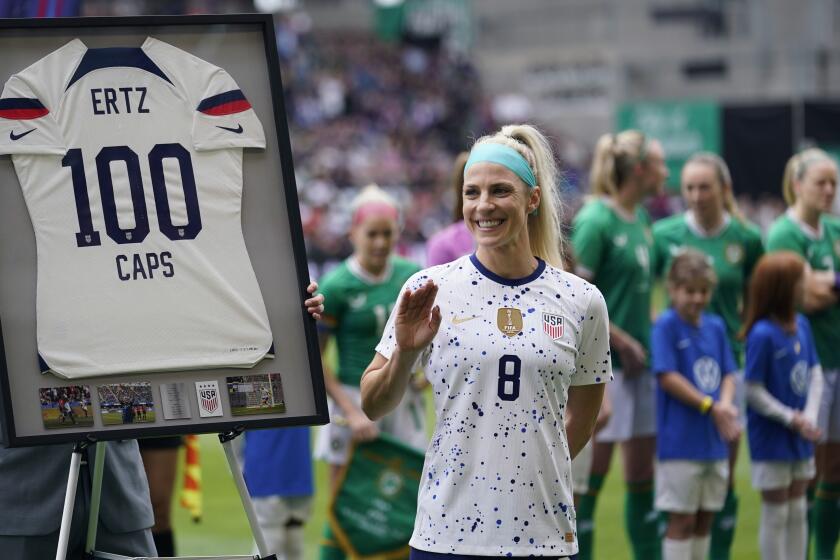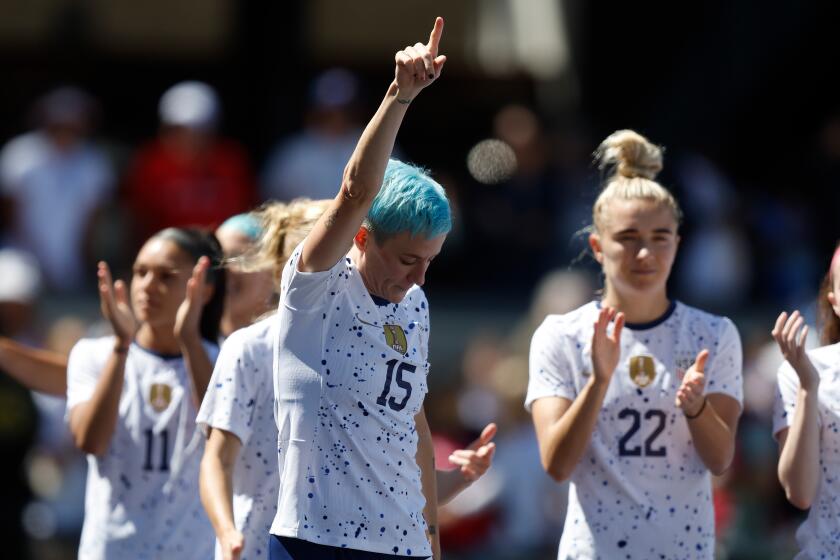FIFA adds game-changing base camps for women’s World Cup, matching men’s perks
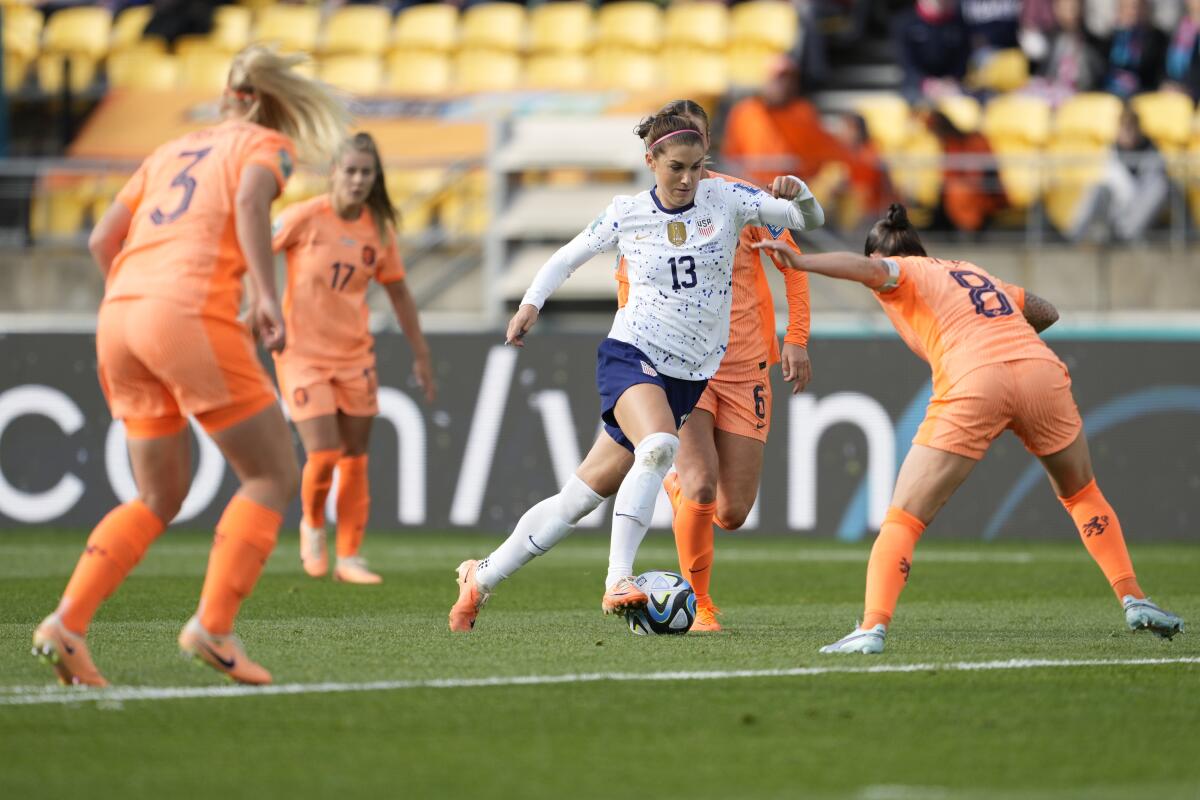
- Share via
AUCKLAND, New Zealand — Through Alex Morgan’s first three World Cups, the U.S. team’s itinerary read like a train schedule. In 2011, the team played its group-play games in Dresden, Sinsheim and Wolfsburg. Four years ago, it went from Reims to Paris to Le Havre.
That meant unpacking, playing and packing up again every four days.
But this year, during the largest women’s World Cup in history and the first spread over two countries, the Americans have made just one 70-minute charter flight from Auckland to Wellington, staying less than 36 hours. The round trip covered fewer than 600 miles — only four other teams in the tournament will travel less in the first round.
And for that, the Americans can thank FIFA, which gave each of the 32 women’s World Cup teams base camps for the first time, allowing them to spend three weeks sleeping in the same bed and training on the same fields, making only brief overnight trips to games.
“I love having a base camp,” Morgan said. “Just being at one hotel, kind of taking over the entire hotel, having all of our recovery modalities available, having U.S. Soccer put in all the resources that we need to be successful. And not only do we have everything we need at the hotel, but the training center has a locker room, a gym.
“It just makes us feel just a little more like a daily routine and less like a traveling circus. And that’s a good thing.”
Teams in the men’s World Cup have long operated out of base camps, the more elaborate the better. When Germany won the title in 2014, it stayed in the Brazilian beachfront resort of Santa Cruz Cabralia. Four years earlier in South Africa, Slovakia asked for its hotel to be outfitted with an electronic dartboard and two pingpong tables, the Italians imported their own pasta and gym equipment and Diego Maradona, then coach of the Argentine team, ordered his suite remodeled with expensive toilets and bidets.
The process to secure the most luxurious digs can be as competitive as the World Cup itself.
Ahead of last fall’s men’s tournament in Qatar, the U.S. explored 28 possible base camps before whittling the list down to 10. Coach Gregg Berhalter and Tom King, U.S. Soccer’s chief administrator, then went to Doha where they settled on the Kempinski Hotel, a sprawling five-star resort on a man-made island that every other team also coveted. So King practiced signing into the FIFA website from U.S. Soccer’s home in Chicago, hoping that when the online bidding process opened his flying fingers would assure the U.S. would be the first to submit an application.
King even had another federation employee ready on stand-by in case he had a power outage or other issue with his computer.
Until this summer, women’s teams enjoyed none of those perks, often sharing mid-range or even budget hotels with rival teams. In 2007, for example, when the U.S. lost to Brazil in the semifinals, the Americans had to listen to their conquerors celebrating all night. Two tournaments later, it was the U.S. holding a noisy celebration at the Montreal hotel it shared with Germany, which it had just eliminated in the semifinals.
Ashley Sanchez didn’t get into the Americans’ first game or their 1-1 tie against the Netherlands, but she was in the minds and hearts of watchful Monrovia supporters.
“The first day I almost walked into the German meal room,” said Jill Ellis said, then the U.S. coach. “Is it ideal? You just make it work.”
But perhaps the biggest drawback was the fact that the teams had to pack up and move before every game. Four years ago in France, the U.S. opened the tournament in Reims, played its second game in Paris, then bused 2½ hours to Normandy to close group play in Le Havre.
FIFA did away with all that this year in an effort to make the World Cup experience — if not the pay — more equal between the men and women. Now players can unpack when they arrive, confident in knowing they won’t need a suitcase again until the knockout stages.
“To do that we must provide elite environments for the 32 teams to train, rest and recover,” said Sarai Bareman, FIFA’s chief women’s football officer. “FIFA is committed to enhancing the standards and conditions for teams at each FIFA Women’s World Cup, and the introduction of dedicated team base camps is a clear demonstration of that commitment and our drive to grow and develop women’s football.”
New Zealand captain Ali Riley, one of the players who fought for more equal treatment, said benefits such as private rooms, charter flights and base camps can make a big difference during the monthlong tournament.
Julie Ertz hadn’t played a game since the final match of the Tokyo Olympics in the summer of 2021, taking time off to start a family and heal injuries.
“Having single rooms, that’s not something that we could ever imagine,” she said. “These are all things that make a huge impact and that was something that we were really pushing for. So this is a very important step forward.”
The U.S. and New Zealand are two of six World Cup teams based in Auckland, New Zealand’s largest city, where the American players and coaches are the only guests at a 130-room designer hotel nestled along the city’s harbor.
“There’s a comfort level that comes with having a hotel and training site that is only for us,” said U.S. Soccer spokesman Neil Buethe. “By having a base camp, we’re able to create an environment during an extended amount of time that provides the team with everything they need. Providing that structure for the players and coaches is incredibly helpful, as it allows them to worry less about the some of the day-to-day things and concentrate on the most important aspect, which is preparing for, and playing, each and every match.”
Among the main perks for the caffeine-addled U.S. is a coffee bar with a dedicated barista and a lounge where players can hang out together.
“It’s a way to make this feel more like home,” defender Sofia Huerta said. “We’re here for so long, spending so much of our time away from home, I think the federation really wanted it to feel like we were in a good routine, that we felt comfortable and like we were home. So the way they set up our rooms, all the recovery we have available, and just the easy access to everything that you know we need to be successful has been amazing.
“I’ve never experienced that before, so I love it.”
The 2023 FIFA Women’s World Cup prize money purse is a record $152 million, a 300% jump from 2019. Still, it remains roughly a third of the men’s purse.
Other countries have done the same for its players. England’s base camp 90 minutes up the coast from Sydney, the temporary home for 30 staff members and 23 players, has a game room, a dining area, a diary room and a relaxation room, some of them named after legendary players such as Jill Scott and Ellen White. Staff members spent three days dressing the hotel up before the players arrived.
Sports psychologists say the benefits of a base camp go beyond just free coffee and a diary room, though. Creating an environment of comfort that replicates what they are used to can help relax athletes who are having to perform under high pressure a long way from home. It’s why two-time World Cup winner Tobin Heath always brought a pillow with her on trips.
That’s all about to end though. If the Americans win Tuesday’s group-play finale with Portugal at Auckland’s Eden Park stadium, the players will have a couple of days to pack and get ready to resume a nomadic lifestyle in the knockout rounds, which will take them to Australia to start the round of 16. If they return to Auckland, it will be to a different hotel and training facility.
But at least they won’t be sharing the place with their opponents.
More to Read
Go beyond the scoreboard
Get the latest on L.A.'s teams in the daily Sports Report newsletter.
You may occasionally receive promotional content from the Los Angeles Times.

